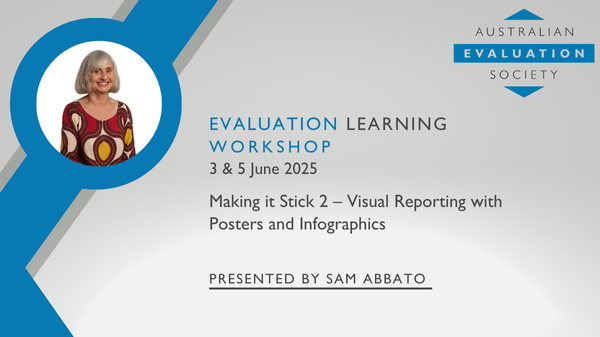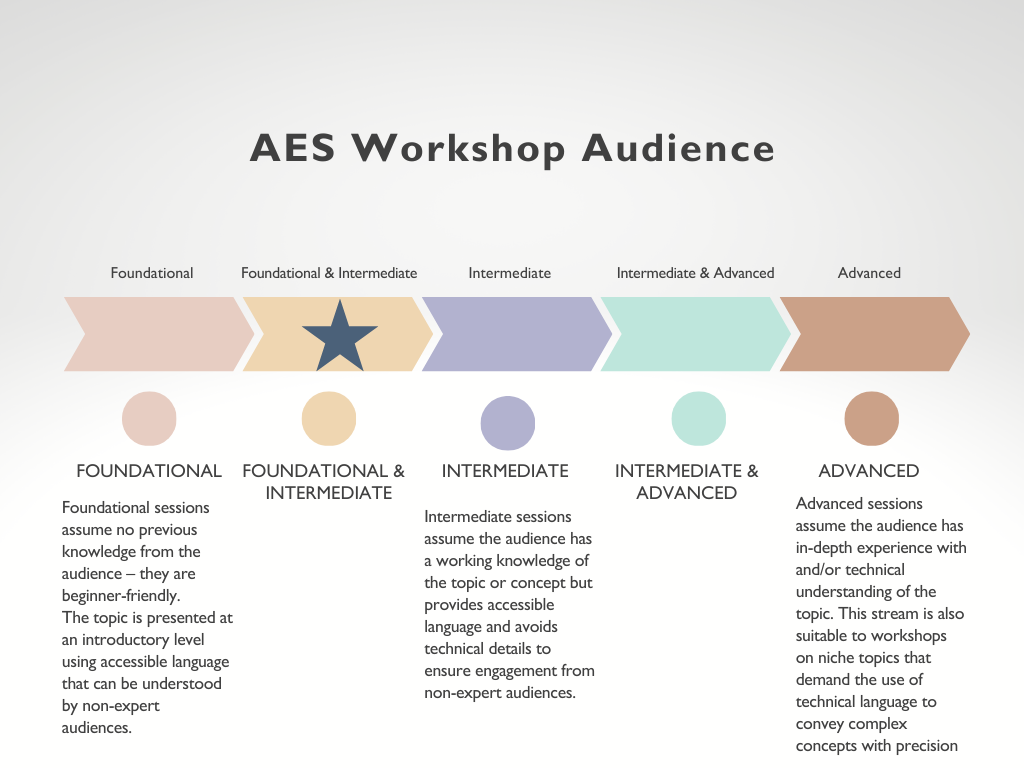Workshop: Making it stick 2 –Visual Reporting with Posters and Infographics (Online 3 & 5 June 2025)

Workshop: Making it Stick 2 – Visual Reporting with Posters and Infographics
Date and time: Tuesday 3 June and Thursday 5 June 2025, 9.30am to 1.00pm AEST (registration from 9.15am). Registrants are to attend both sessions. (full day workshop - 2 sessions)
Venue: Via Zoom. Details will be emailed to registrants just prior to the workshop start time
Facilitator: Dr. Samantha Abbato
Register online by: Monday 2 June 2025. Spaces limited to 25 participants
Fees (GST inclusive): Members $325.00, AES Organisational member staff $460.00, Non-members $535.00, Student member $155.00, Student non-member $250.00* (GST inclusive) *Students must send proof of their full-time student status to
Workshop Overview
In the context of continued underuse and misuse of evaluation findings, effectively engaging and communicating with the intended users of evaluation reports is more critical than ever. Technological advances in visual tools provide an opportunity to present evaluation findings impactfully using a pictures and stories approach. Printed, online and interactive infographics and posters can democratise evaluation reporting and invite report users and other stakeholders to find out more through the clarity of visual messaging. This workshop aims to provide participants with the knowledge, skills and tools needed to create successful infographics and posters that tell an impactful story with pictures.
Although there has been a rapid increase in the use of infographics and posters in evaluation, their design quality and impact have not kept pace. In this practical workshop, the facilitator draws on a decade of experience in creating infographics and posters to communicate evaluation results and build evaluation capacity. Participants will be introduced to tools and templates for creating well-designed visuals that engage and effectively communicate with stakeholders. Whether you are looking at developing an impactful visual report or using visual tools and storytelling within your written reports more effectively, this workshop will provide the principles, tools and practical steps you need. The tools and techniques covered in this workshop can also be applied to increase the impact of other evaluation reporting, including PowerPoint presentations and website content.
Workshop Content
The workshop will be interactive and involve sharing experiences and practical activities. A review of the communication and use principles and tools covered in the Making it Stick 1 workshop will provide the basis for participants to experiment with innovation to create memorable visual reports. Case studies from the presenter's experience as part of a multidisciplinary team will be discussed, including photography, graphic design, cartooning, videography, systems thinking, and organisational psychology.
Participants can apply the learned knowledge to real-life examples in small groups throughout the workshop. Participants will be provided tools, templates and opportunities to apply new skills to their own work. Four main areas will be covered.
1. Applying communication and evaluation use principles to planning and creating visuals: After introducing examples of visual reports, including posters, infographics, and online interactive reports, we support you in applying templates and tools to clarify the report message and effectively deliver it as a coherent visual story to priority stakeholders. Participants will practice planning an infographic or poster using Mural or Miro's online software and reflect on how this planning can improve the executive summary or one-page report handouts.
2. Creating compelling and credible visuals: We provide the practical steps for creating and sourcing compelling images and illustrations and credible data visualisations. We show you how to use a message-based approach to choosing impactful visuals. Apply a checklist to systematically assess pictures to include in your visual project and take away a fillable PDF version to increase your projects' visual impact.
3. Visual storytelling tools: Learn and apply visual storytelling tools, including the storyboard and story arc, to communicate your message in a cohesive, coherent and impactful way. We show you how these tools used to ‘show’ the story in a poster can also be used to more effectively ‘tell’ the story in a written report or summary.
4. Impactful design: We expand on the design principles introduced in Stick 1 to provide the tools you need to balance pictures and words for your priority audiences. Apply strategies to understand the audience's journey through the visuals and use this information to make changes to increase impact further.
5. Role of the visual report: Identify the role of the planned visual report product in the reporting suite to ensure maximum stakeholder engagement, transparency and rigour of evidence.
Workshop Outcomes
This workshop is for evaluators and other professionals who would like to:
- Use technological advances in digital and online tools to explore possibilities beyond the traditional written report to incorporate visual approaches such as infographics, posters and online interactive platforms;
- Further their skills in telling a compelling story for communicating evaluation findings using a message-based approach and storytelling tools such as key message, storyboard and story arc;
- Design a visual alternative to their written reports and, at the same time, use the visual story elements to increase the stickiness of their written reports;
-Increase the impact of the visuals they use in all types of reporting and communication;
- Apply design principles to increase the impact of infographics, posters, and other reporting and communication mediums such as PowerPoint presentations and website content.
PL competencies
This workshop aligns with competencies in the AES Evaluator’s Professional Learning Competency Framework. The identified domains are
-
Domain 1 – Evaluative attitude and professional practice;
-
Domain 3 – Culture, stakeholders and context;
-
Domain 5 – Project management;
-
Domain 6 – Interpersonal skills;
-
Domain 7 – Evaluation activities.
Who should attend?
This workshop is designed for professionals who commission, craft or use evaluation reports. It is intended as an ideal follow-on workshop for people who have completed “Making it Stick 1 – Crafting an Evaluation Report for Impact and Use”. It is, however, not essential that participants have attended Stick 1.
It will particularly benefit evaluators and other professionals at an intermediate level of evaluation report crafting.

Workshop start times
-
VIC, NSW, ACT, TAS, QLD: 9.30am
-
SA, NT: 9.00am
-
WA: 8.30am
-
New Zealand: 11.30am
-
For other time zones please go to https://www.timeanddate.com/worldclock/converter.html
About the facilitator
Dr. Samantha Abbato is the director of a transdisciplinary consortium of professionals, including a videographer, a graphic designer, a systems thinker, and a virtual reality practitioner. Over the past ten years the facilitator has successfully experimented across these other disciplines to un-box evaluation reporting. She has had considerable experience crafting evaluation reports using these multidisciplinary tools across several sectors. She regularly facilitates workshops for AES professional development and internal facilitator training for community and health sector clients.
With a passion for communication, maximising evaluation use, and a transdisciplinary approach to evaluation, the facilitator can offer a wealth of case studies of unboxing and increasing the impact of evaluation reporting using transdisciplinary approaches. Her most recent evaluation work includes evaluation and M&E reporting using systems thinking, videography, graphic communication, design thinking, and virtual reality. In addition, the facilitator has completed more than 100 evaluation and research reports and papers for a range of government, non-government organisations, and community stakeholders, including several peer-reviewed publications in 2018 incorporating transdisciplinary approaches.
Event Information
| Event Date | 03 Jun 2025 9:30am |
| Event End Date | 05 Jun 2025 1:00pm |
| Cut Off Date | 02 Jun 2025 4:00pm |
| Location | Zoom |
| Categories | Online Workshops |
